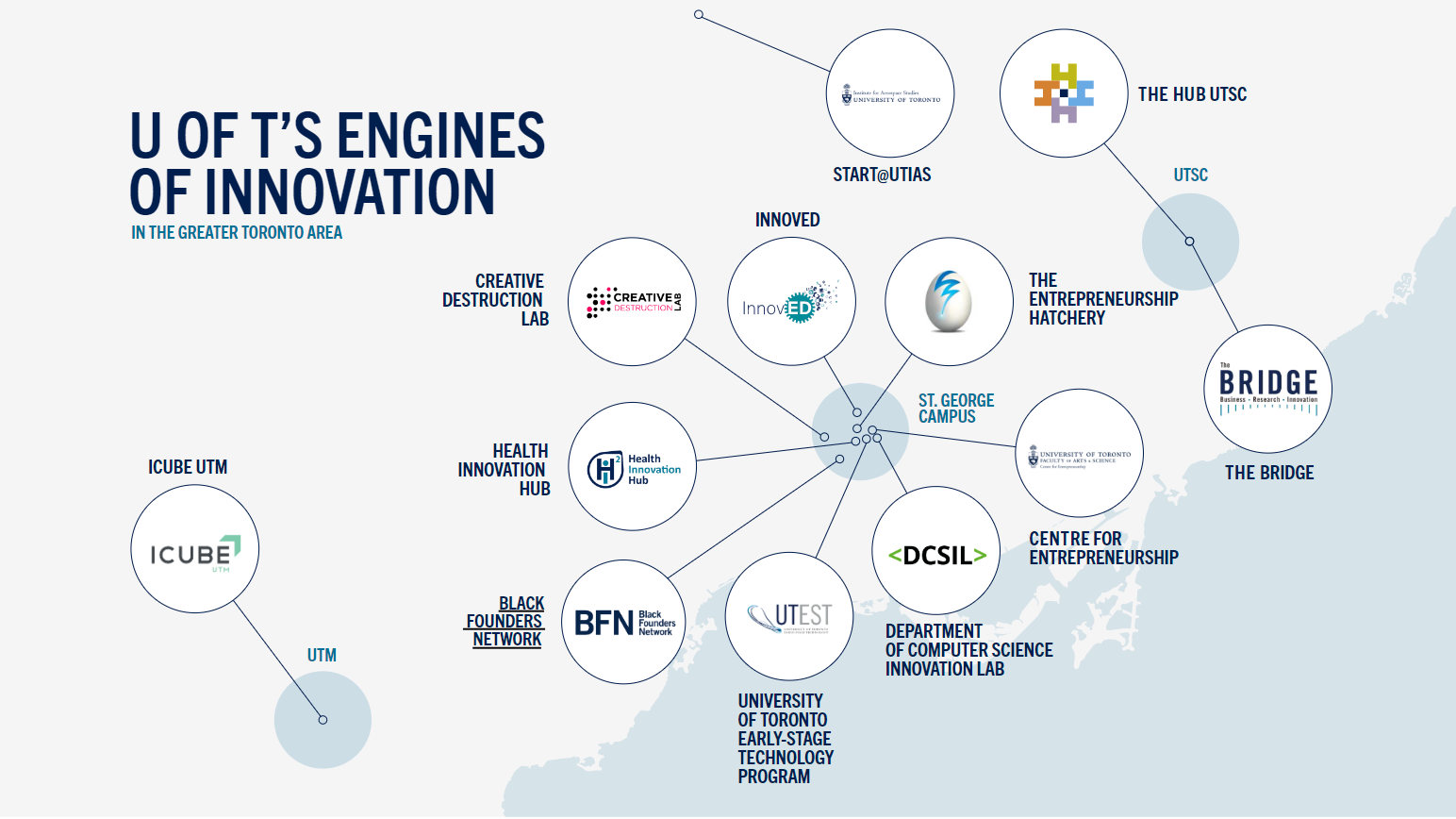U of T among top five university business incubators in the world

The University of Toronto has been recognized as one of the top five university business incubators in the world by UBI Global in its latest world benchmark study.
In its 2021-2022 study, UBI Global – a Swedish-based innovation intelligence company with more than 1,000 member organizations – assessed 1895 organizations from 90 countries.
The top organizations were benchmarked across 21 key performance indicators against their global peers based on the value they provide to their innovation ecosystems and client startups.
“The UBI ranking is a reinforcement of all the great work that so many U of T students, faculty and alumni entrepreneurs have been doing,” says Jon French, director of University of Toronto Entrepreneurship, the umbrella organization for the incubators, accelerators and entrepreneurship programs across U of T’s three campuses. “It’s a recognition of how we fare against the best in the world.”
The ranking is particularly notable, French adds, since UBI is one of the only organizations examining both economic and social impact in its global assessment of the post-secondary entrepreneurship space.
“The approach that UBI takes is quite holistic – they measure hard metrics, including funding raised and jobs created, but they also take a look at criteria such as where the mentor network is coming from and how engaged the university’s alumni are,” French says, noting that U of T scored high on all such indicators in the UBI report and takes pride in supporting innovators at all stages of their journey – everyone from idea-stage student entrepreneurs to faculty members and PhD researchers seeking to commercialize their work.
Over the past decade, U of T entrepreneurs have created more than 600 venture-backed companies and secured more than $2.5 billion in investment. U of T Entrepreneurship, for its part, supports current and aspiring entrepreneurs by providing: co-working, meeting and event spaces; mentorship and advisory supports; pitch competitions and prizes; and access to investor networks to secure funding.

U of T’s network of campus accelerators and incubators in the Greater Toronto Area are currently supporting more than 500 teams working on potential startups.
“It is important that our entrepreneurs have a sense of community – they are surrounded by like-minded people who are excited about innovation and turning ideas and opportunities into companies,” French says. “Across the 10-plus campus accelerators on our three campuses, we currently have over 500 teams that are working on projects that could become companies.”
UBI’s world benchmark study is a third-party assessment, based on a comprehensive survey, that analyzes the impact and performance of business incubators and accelerators from four sectors: university, public, private and corporate. Its framework for analysis was developed in collaboration with an advisory board comprising innovation thought leaders and industry experts.
Other Canadian universities also ranked highly in their categories in the UBI report, including incubators from McGill University, York University, Memorial University and École de technologie supérieure.
Many of the U of T-backed success stories flagged for the UBI survey stemmed from the university’s strength in leading-edge research fields such as quantum computing, biotech, clean tech, advanced manufacturing and machine learning. In particular, French points to the recent announcement of $40 million in federal funding for U of T startup Xanadu Quantum Technologies – an alumnus of the Creative Destructive Lab (CDL) at the Rotman School of Management that was founded by former U of T post-doctoral physics researcher Christian Weedbrook – and the more than 150 ventures supported annually by the Health Innovation Hub (H2i).
French noted that U of T’s commitment to entrepreneurship is longstanding, with several incubators and accelerators recently celebrating their 10-year anniversaries. They include CDL, The Hatchery at the Faculty of Applied Science & Engineering and the UTEST accelerator.
“And now when we look at the new Schwartz Reisman Innovation Campus close to opening on the St. George campus, that’s again an example of U of T doubling down on how important innovation and entrepreneurship are to the university,” he says.
U of T’s world-leading innovation network – which includes U of T Scarborough’s The Hub and The BRIDGE, as well as U of T Mississauga’s ICUBE – will be showcased during Entrepreneurship Week from March 6 to 9, featuring more than 15 free in-person, hybrid and virtual public events to teach, inspire and celebrate entrepreneurship on campus.
One flagship event returning in-person for the first time in three years is the True Blue Expo on March 9, where more than 40 U of T startups, accelerators and community partners will be sharing information on their products and services.
“We’ll be highlighting groundbreaking companies during Entrepreneurship Week, including those led by women founders and startups connected to our Black Founders Network,” French says. “All three campuses are represented – it’s really a snapshot of what makes U of T entrepreneurship so special.”
(Article by Tabassum Siddiqui, Photo by Matthew Dochstader))
Read more about U of T’s startup ecosystem in our most recent report on Canada’s quantum hubs, here.
